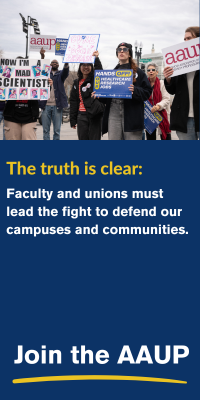- About
- Programs
- Issues
- Academic Freedom
- Political Attacks on Higher Education
- Resources on Collective Bargaining
- Shared Governance
- Campus Protests
- Faculty Compensation
- Racial Justice
- Diversity in Higher Ed
- Financial Crisis
- Privatization and OPMs
- Contingent Faculty Positions
- Tenure
- Workplace Issues
- Gender and Sexuality in Higher Ed
- Targeted Harassment
- Intellectual Property & Copyright
- Civility
- The Family and Medical Leave Act
- Pregnancy in the Academy
- Publications
- Data
- News
- Membership
- Chapters
AAUP Archives
The archives of the Association, which include materials dating from the AAUP’s founding in 1915, are housed at George Washington University in Washington, DC. Researchers wishing to use the archives should contact the special collections department at the university’s library.
Historical Recordings
The AAUP’s archives include several Dictaphone recordings of interviews from the late 1950s and early 1960s with Arthur O. Lovejoy, the Johns Hopkins University philosophy professor who played a key role in the founding of the AAUP. Audio excerpts from these interviews are presented below.
The Ross Case (2:41): In 1900, economist Edward Ross was dismissed from his faculty position at Stanford University at the behest of Jane Lathrop Stanford, the widow of the university’s railroad-magnate founder, after Ross had criticized railroad monopolies and the use of immigrant labor. Ross’s dismissal prompted Lovejoy and six others to resign from their faculty positions at Stanford, and the case made a lasting impression on him. In this recording, Lovejoy recalls the circumstances surrounding Ross’s dismissal.
Organizing Meeting (1:38): Lovejoy was appointed to the faculty at Johns Hopkins University in 1910, and he soon began organizing his colleagues to “take the first steps toward” establishing a professional association for faculty members. In this clip, Lovejoy speaks of how he helped to lay the foundation for an organizing meeting that preceded the formation of the AAUP.
John Dewey (3:45): The “public” founding of the AAUP in New York in January 1915 was made possible by the planning work done by Lovejoy and others. In this recording, Lovejoy continues to discuss the process of building support for the Association among professors and speaks about the recruitment of John Dewey, a nationally known professor of philosophy at Columbia University, as the first president of the AAUP.
The First Investigation (4:29): In March 1915, just months after the founding of the AAUP, seventeen faculty members at the University of Utah resigned in protest after the appointments of four of their colleagues were abruptly terminated by the president and board of trustees. The dismissals bore similarities to the Edward Ross case, and Lovejoy, upon learning of the situation, urged the new association to investigate. In this recording, Lovejoy recollects how the AAUP's first investigation was set in motion.



